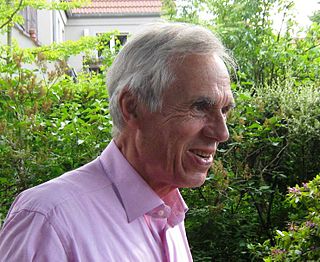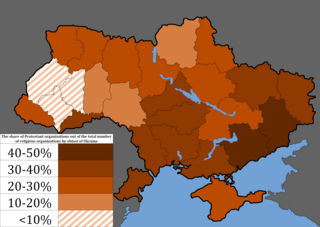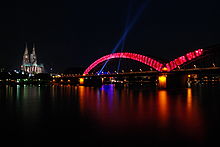
Pietism, also known as Pietistic Lutheranism, is a movement within Lutheranism that combines its emphasis on biblical doctrine with an emphasis on individual piety and living a vigorous Christian life. It is also related to its non-Lutheran Radical Pietism offshoot that either diversified or spread into various denominations or traditions, and has also had a contributing influence over the interdenominational Evangelical Christianity movement.
The Confessing Church was a movement within German Protestantism during Nazi Germany that arose in opposition to government-sponsored efforts to unify all Protestant churches into a single pro-Nazi German Evangelical Church.

The Wisconsin Evangelical Lutheran Synod (WELS), also referred to simply as the Wisconsin Synod, is an American Confessional Lutheran denomination of Christianity. Characterized as theologically conservative, it was founded in 1850 in Milwaukee, Wisconsin.

German Christians were a pressure group and a movement within the German Evangelical Church that existed between 1932 and 1945, aligned towards the antisemitic, racist and Führerprinzip ideological principles of Nazism with the goal to align German Protestantism as a whole towards those principles. Their advocacy of these principles led to a schism within 23 of the initially 28 regional church bodies (Landeskirchen) in Germany and the attendant foundation of the opposing Confessing Church in 1934.

Konrad Raiser is a former General Secretary of the World Council of Churches (WCC).
The Evangelical Church Conference was a convention of delegates from the different Protestant denominations in Germany and Austria.

Margot Käßmann is a Lutheran theologian, who was Landesbischöfin (bishop) of the Evangelical-Lutheran Church of Hanover in Germany. On 28 October 2009, she was elected to lead the Evangelical Church in Germany, a federation of Protestant church bodies in Germany. She stepped down from both offices on 24 February 2010 following a drunk-driving incident. After serving as an "Reformation Ambassador" for the 500th anniversary of Reformation, she retired in 2018.

Wolfgang Huber is a prominent German theologian and ethicist. Huber served as bishop of the Evangelical Church of Berlin-Brandenburg-Silesian Upper Lusatia until November 2009. Huber succeeded Manfred Kock as Chairperson of the Council of the Evangelical Church in Germany (EKD) in November 2003 and was succeeded by Bishop Margot Käßmann, the first woman in that position, in October 2009.

Protestants in Ukraine number about 600,000 to 700,000 (2007), about 2% of the total population. Nearly all traditional Protestant denominations are represented in the country. According to Christianity Today magazine, Ukraine has become not just the "Bible Belt" of Eastern Europe, but a "hub of evangelical church life, education, and missions". At present, the country is a key supplier of missionaries and a center of evangelical training and press printing for all the countries of the former Soviet Union, where the legal environment is not so favourable.
Dieter Trautwein was a German Protestant theologian and writer of numerous Christian hymns of the genre Neues Geistliches Lied (NGL).

The Evangelical Church of Romania is a Protestant denomination that emerged out of the Romanian Orthodox Church. It is one of Romania's eighteen officially recognised religious denominations.
The German Evangelical Church Confederation was a formal federation of 28 regional Protestant churches (Landeskirchen) of Lutheran, Reformed or United Protestant administration or confession. It existed during the Weimar Republic from 1922 until being replaced by the German Evangelical Church in 1933. It was a predecessor body to the Evangelical Church in Germany.
"Wo Menschen sich vergessen" is a Christian hymn in German, with text written in 1989 by Thomas Laubach and with music by Christoph Lehmann. The hymn of the genre Neues Geistliches Lied (NGL) is also known by the beginning of the refrain, "Da berühren sich Himmel und Erde". It appears in regional sections of the 2013 hymnal Gotteslob, and in other songbooks.

Ökumenische Arbeitsgruppe Homosexuelle und Kirche (HuK), German for Working Group Homosexuality and Church, is a German NGO organized by LGBTTIQ Christians of different denominations in concern of homosexual people in religion and churches. Although the claim of the association is cross-gender, the members are mostly gay men. Lesbians who are interested in this topic are also organized in women-specific associations in Germany.
The Ökumenischer Kirchentag 2021 was the third ecumenical convention of lay Christians of different denominations in Germany. It was held in Frankfurt, Hesse from 13 to 16 May 2021. Due to the COVID-19 pandemic, the event happened mostly digitally, with only a few events actually taking place with live audience in Frankfurt.
Habakuk is a German pop band from Frankfurt, formed in 1975. The group is focused on new Christian music of the genre Neues Geistliches Lied.
"Ich lobe meinen Gott, der aus der Tiefe mich holt" is a 1979 Christian hymn with words in German by Hans-Jürgen Netz and a melody by Christoph Lehmann. This Neues Geistliches Lied song has appeared in the German Protestant and Catholic hymnals. It is a preferred song for conventions such as Kirchentag.










